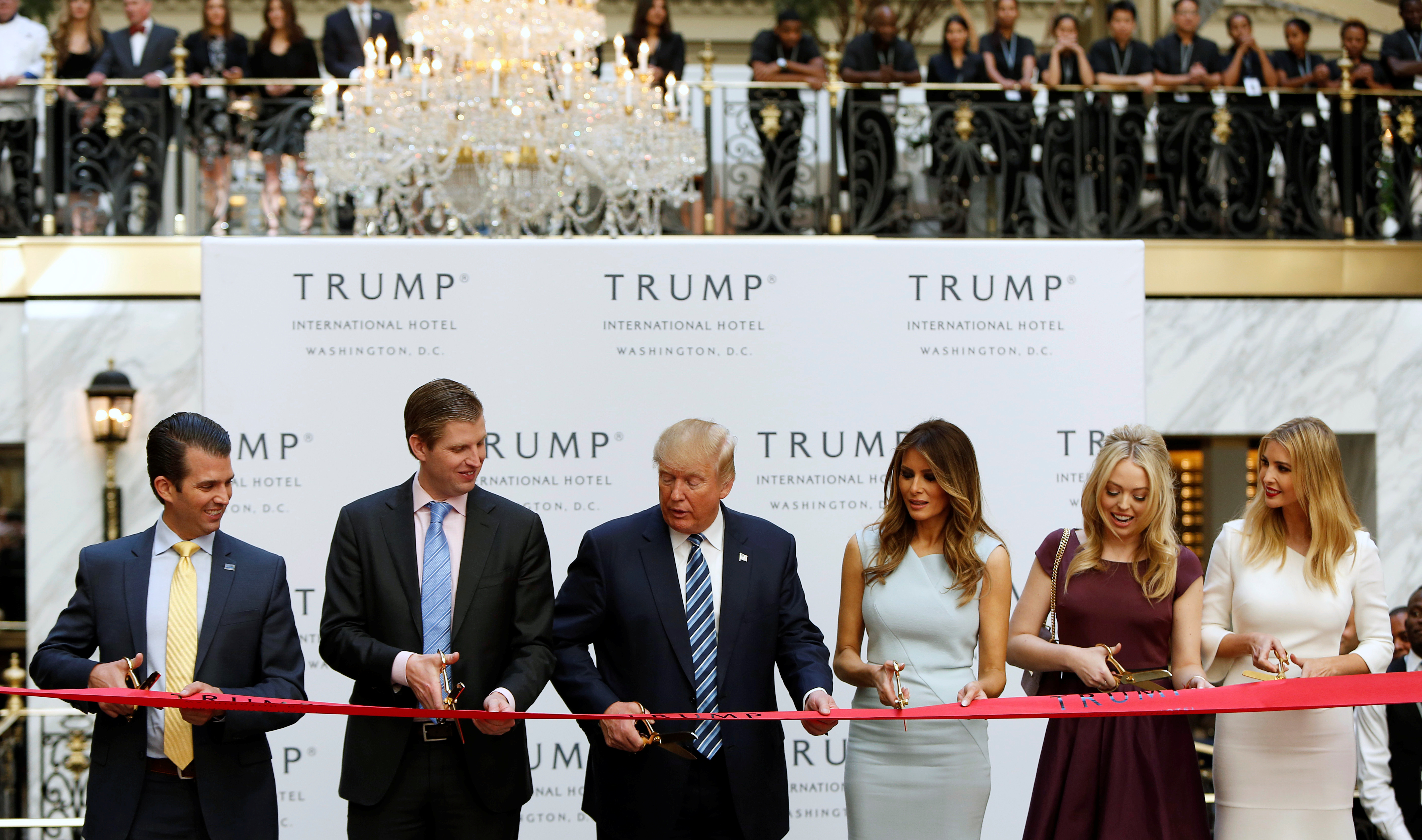Will the government fight Trump's corruption? This will be the first test.
What Trump hotel's landlord does on Jan. 20 is immensely important


It's no secret that President-elect Donald Trump's sprawling business empire comes with an avalanche of potential conflicts of interests. The possibilities range across at least 20 countries, from regulators overseeing the banks that loaned money to his companies, to foreign officials that could be pressed into changing policies to help his real estate deals. When Trump assumes the presidency, he will enjoy a vertiginous array of chances to indulge in self-dealing.
The question now is: What will American institutions do about it? Will regulators, officials, agencies, activists, watchdogs, and reporters implicitly accept these conflicts of interests as a new normal? Or will they resist? The growing fracas around the Trump International Hotel in Washington, D.C., will provide an important initial test.
The property is already on a collision course with Trump's future powers as president. Trump's company leased the Old Post Office building from the government — via the General Services Administration (GSA) — in order to transform it into the real estate mogul's newest prize.
The Week
Escape your echo chamber. Get the facts behind the news, plus analysis from multiple perspectives.

Sign up for The Week's Free Newsletters
From our morning news briefing to a weekly Good News Newsletter, get the best of The Week delivered directly to your inbox.
From our morning news briefing to a weekly Good News Newsletter, get the best of The Week delivered directly to your inbox.
Foreign diplomats are reportedly already feeling pressure to stay at Trump's hotel when they visit the nation's capital, lest they offend the new president. And the terms of the lease mean Trump's company has ongoing obligations the GSA must oversee — so the agency's boss will own the company they're meant to keep tabs on.
Yet it turns out there's an even deeper — and much more dramatic — problem.
An overview published Monday in Government Executive, by procurement experts Steven L. Schooner and Daniel I. Gordon, noted the lease for the Old Post Office building is actually somewhat unusual. It contains very specific language stating "No… elected official of the government of the United States… shall be admitted to any share or part of this lease, or to any benefit that may arise therefrom."
The language was put in specifically "to avoid the appearance of favoritism or preferential treatment by the government toward its employees." Yet Trump is about to become on elected official of the government, while owning and chairing the company that's leasing the Old Post Office building. Put simply, the moment Donald Trump becomes president on Jan. 20, 2017, he will be in legal breach of the contract.
A free daily email with the biggest news stories of the day – and the best features from TheWeek.com
Unfortunately, the lease is unusual in another way as well: Language that's normally in these sorts of contracts, allowing the government to unilaterally pull out of the deal, is not there in this case. The GSA is not allowed to use that escape hatch. That sets up a perverse catch-22: Trump will inevitably breach the contract when he becomes president, but the GSA can't preemptively pull out of the mess without also breaching the contract.
One way or another, someone is going to do something that will open them up to litigation.
Of course, the most likely solution Trump will propose is the same one he's put forward for all his business holdings: His children will take over the company, removing him from the picture. Schooner and Gordon are rightly skeptical of this. It's not as if Trump will suddenly forget that his name is on the building at 1100 Pennsylvania Ave NW. The staff at the GSA would just wind up negotiating with their boss' kids rather than their boss directly. In fact, this is the whole problem with Trump's argument: Unless all of the Trump Organization's real estate holdings are liquidated into cash, it can't actually function as a "blind trust" in any meaningful sense.
Schooner and Gordon conclude that the GSA must bite the bullet: Break the contract and pull out of the deal before Jan. 20, and face Trump's almost-certain litigious wrath knowing they'll have the better of the argument in court.
They're right. But the importance of the point doesn't just end with this case. This will likely be the first of many instances where Trump's self-dealing becomes a national issue. He's reportedly already used foreign diplomacy to try to get the British government to help out one of his golf courses. We actually have no idea how far Trump's business operations extend, so there's no telling how big the parade of horribles could get over the next four years. The Senate could be well within its rights to impeach Trump over any business gains from abroad that fall afoul of the emoluments clause. And sufficient political pressure could force Trump to give an independent monitor wide-ranging access to his company's operations. The monitor could report to the public on any possible conflict of interest. At the very least, it would keep voters, activists, politicians, watchdogs, and reporters informed.
But we need to give the officials and institutions involved in all those questions the courage, or the proper incentive, to make those choices. House Oversight Committee Chairman Jason Chaffetz (R-Utah) once referred to a potential Clinton presidency as a "target rich environment." The looming Trump presidency clearly puts that environment to shame, but so far we haven't heard a peep from Chaffetz on whether he'll investigate. So clearly, some prodding is in order.
That requires setting the tone before Trump even takes office: Establish that Trump's indulgent, far-reaching risk of corruption is not normal, is not okay, and should be resisted by people of principle.
The GSA can do that by throwing down the gauntlet now, with everyone watching.
Jeff Spross was the economics and business correspondent at TheWeek.com. He was previously a reporter at ThinkProgress.
-
 Bari Weiss’ ‘60 Minutes’ scandal is about more than one report
Bari Weiss’ ‘60 Minutes’ scandal is about more than one reportIN THE SPOTLIGHT By blocking an approved segment on a controversial prison holding US deportees in El Salvador, the editor-in-chief of CBS News has become the main story
-
 Has Zohran Mamdani shown the Democrats how to win again?
Has Zohran Mamdani shown the Democrats how to win again?Today’s Big Question New York City mayoral election touted as victory for left-wing populists but moderate centrist wins elsewhere present more complex path for Democratic Party
-
 Millions turn out for anti-Trump ‘No Kings’ rallies
Millions turn out for anti-Trump ‘No Kings’ ralliesSpeed Read An estimated 7 million people participated, 2 million more than at the first ‘No Kings’ protest in June
-
 Ghislaine Maxwell: angling for a Trump pardon
Ghislaine Maxwell: angling for a Trump pardonTalking Point Convicted sex trafficker's testimony could shed new light on president's links to Jeffrey Epstein
-
 The last words and final moments of 40 presidents
The last words and final moments of 40 presidentsThe Explainer Some are eloquent quotes worthy of the holders of the highest office in the nation, and others... aren't
-
 The JFK files: the truth at last?
The JFK files: the truth at last?In The Spotlight More than 64,000 previously classified documents relating the 1963 assassination of John F. Kennedy have been released by the Trump administration
-
 'Seriously, not literally': how should the world take Donald Trump?
'Seriously, not literally': how should the world take Donald Trump?Today's big question White House rhetoric and reality look likely to become increasingly blurred
-
 Will Trump's 'madman' strategy pay off?
Will Trump's 'madman' strategy pay off?Today's Big Question Incoming US president likes to seem unpredictable but, this time round, world leaders could be wise to his playbook


